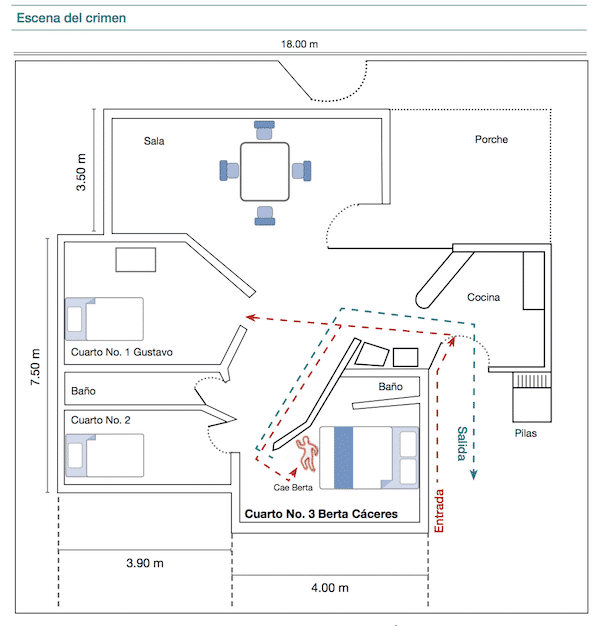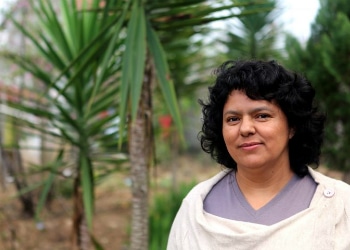A new report has determined that a network of senior business executives and Honduran officials coordinated the murder of renowned environmental rights activist Berta Cáceres, underscoring the extent of criminal collusion between the state and private enterprise in the Central American nation.
The report, released on October 31 by an independent group known as the International Expert Advisory Panel (Grupo Asesor Internacional de Personas Expertas – GAIPE), is titled “Dam Violence: The Plan That Killed Berta Cáceres.”
The authors concluded that the environmental activist’s murder was orchestrated by senior executives of Desarrollos Energéticos SA (DESA) — the company that held the concession to the Agua Zarca hydroelectric dam project, which Cáceres vehemently opposed — as well as DESA employees who surveilled Cáceres and “acted in partnership” with state security forces since “at least November 2015.”
SEE ALSO: Honduras News and Profiles
The report supports this contention with an examination of text messages from cell phones seized by Honduran authorities, two of which were used by DESA manager Sergio Ramón Rodríguez Orellana and former DESA security director Douglas Giovanny Bustillo, both among the eight people who have been detained in connection with the crime.
According to the report, Bustillo sent a text message to a senior DESA executive in February 2016 that read, “mission aborted today,” presumably after the first attempt to kill Cáceres fell through. Text messages also revealed that this was the same executive with whom Bustillo met a month later on March 2, 2016. Cáceres was murdered shortly thereafter, early in the morning on March 3.

(GAIPE graphic showing the scene of Cáceres’ murder)
The report argues that the text messages suggest the order to murder Cáceres came from high-ranking DESA executives, who are not named in the report because they have not been criminally charged by Honduran authorities.
According to the report, the existing evidence is “conclusive regarding the participation of numerous state agents, high-ranking executives and employees of DESA in the planning, execution and cover-up of the assassination.”
However, the report’s authors point out that while Honduran authorities have arrested several suspects accused of carrying out Caceres’ murder, they have not filed charges against those suspected of ordering the killing.
InSight Crime Analysis
Experts consulted by InSight Crime said the new report adds to mounting evidence suggesting that many Honduran elites in both business and government routinely coordinate criminal schemes aimed at advancing their interests.
“The GAIPE report presents powerful evidence that top executives and investors in DESA — including some of the top elite, state actors and others — plotted and executed the assassination of Berta Cáceres,” Dana Frank, a professor at the University of California, Santa Cruz, told InSight Crime.
“This isn’t just about a few rogue actors. It’s the work of the top-most elites and their government allies,” she added. “Now we know that the [Attorney General’s Office] has sat on this evidence of elite complicity since May 2016 without arresting anyone.”
Lisa Haugaard, the executive director of the Washington, DC-based Latin America Working Group, echoed these sentiments.
“The GAIPE report asserts that to date the Honduran judicial system has failed to bring charges against the intellectual authors of the crime, although the GAIPE investigators, sifting through only a part of the information that the Honduran prosecutors have at their disposal, could determine that the eight men charged were taking orders from higher-ups,” she said.
SEE ALSO: Honduras Elites and Organized Crime
The report’s revelations could further aggravate US-Honduras relations, and could also affect the willingness of US congress to approve portions of aid that may be withheld if it is determined that Honduras is not complying with US expectations regarding human rights and corruption.
(Damning testimony in US court from an admitted Honduran drug trafficker has implicated top officials with ties to the drug trade, and a separate report from earlier this year described corruption as the “operating system” in Honduras.)
Immediately after Caceres’ murder, the US Embassy in Honduras called for a “prompt and thorough” investigation. US Congressman Hank Johnson later introduced a bill calling for the suspension of US aid to Honduras until the government showed progress in investigating human rights violations and murders of activists, which have made the Central American country one of the deadliest in the world for environmental defenders.
However, the Honduran government’s commitment to solving the Cáceres case has been questionable at best. In October 2016, the government’s inept handling of the investigation and proescution was highlighted by an embarrassing incident in which case files were stolen from a judge’s vehicle.
To be sure, the GAIPE report has spurred concerns in Washington. According to a US source familiar with discussions at the US State Department, the US congress has yet to receive approval from the State Department to release the 75 percent of aid to the Northern Triangle countries of Guatemala, Honduras and El Salvador that is conditioned on their compliance with US expectations on transparency and prosecuting organized crime, among other things.
The same source told InSight Crime that US aid to Honduras could be at further risk due to the latest revelations in the Cáceres murder case. However, past experience suggests these concerns are unlikely to translate into actual changes in policy or cuts in aid funding.

